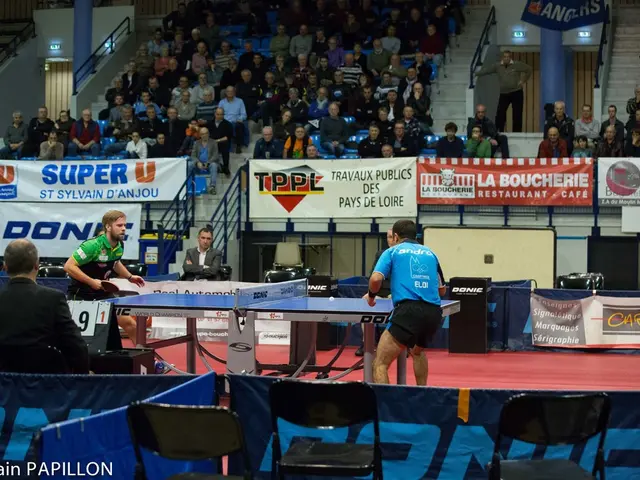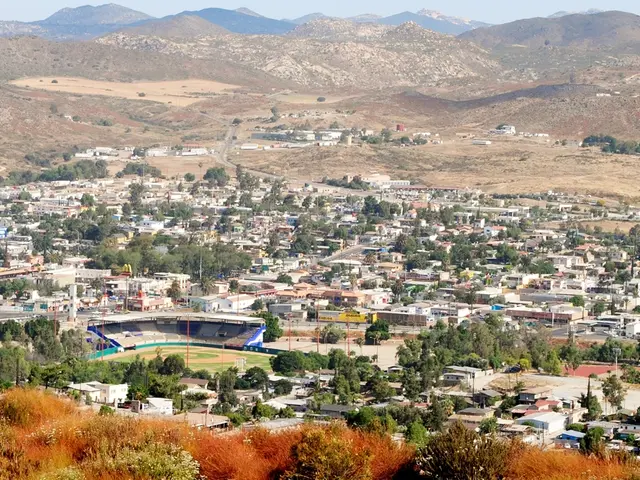Venezuela's Electoral Body Officially Announces Maduro as Winner
Venezuela's 2024 Presidential Elections: A Contested Victory
In the heart of Caracas, July 29, 2024, (our website) - Following an intense electoral battle, Venezuela's National Electoral Council (CNE) declared Nicolás Maduro the winner of the controversial presidential election.
Early Monday afternoon, the newly-elected president was presented with the certifying credentials by CNE President Elvis Amoroso, marking Maduro's third consecutive six-year term, set to officially commence on January 10, 2025.
Addressing the nation, Maduro humbly accepted the mandate, pledging to lead the country towards peace, prosperity, and national unity through dialogue. He also vowed to counteract any coup attempts or acts of violence.
"We have faced this challenge before, and we know the difference between a people who want peace and the extreme right-wing elite," Maduro stated, reiterating his commitment to maintain stability.
In response, Amoroso echoed the election's peaceful and democratic nature despite attempts to incite violence, praising the Venezuelan electorate for exercising their democratic will and electing Maduro as their constitutional president.
Millions of Venezuelans flocked to the polls on Sunday to make their voices heard among nine candidates, including Maduro and his main opposition rival, Edmundo González. With staggering vote counts rolling in, Amoroso announced an "irreversible trend" favoring Maduro with 51.2 percent of the vote against González's 44.2 percent.
The other eight candidates managed to garner a combined 4.5 percent of the vote, while turnout was reported at 59 percent. The detailed electoral results are yet to be published on the CNE website.
The wait for the official results was caused by a cyber-attack that targeted the data transmission system, delaying the result announcement. Venezuela's Attorney General Tarek William Saab launched an investigation into the alleged hacking, warning against any violent agendas.
In stark contrast, the U.S.-backed opposition, led by figures like María Corina Machado, has vehemently disputed the official results and proclaimed González as the not-so-secret winner. During a press conference, Machado asserted that González won with 70 percent of the vote, basing her claim on internal polling data from her campaign.
However, no evidence has been made available to support this assertion. The opposition leader has also threatened to take action to defend the supposed truth and called upon Venezuela's armed forces to stand on the right side of history.
Citing concerns about the election's legitimacy, the U.S. government, led by Secretary of State Antony Blinken, has threatened potential consequences against the Venezuelan government. The Biden administration is awaiting the announcement of detailed results before making a final judgement.
With both political sides claiming victory, incidents of disturbances have been reported throughout Caracas and other regions across the country. Some opposition supporters have staged "cacerolazos" (pot banging) in their communities, while protesters have set tires ablaze to block major avenues and highways.
State forces have been working diligently to quell the tension, successfully preventing any major confrontations. Most retail and service activities have paused as a precautionary measure.
The international community, including the United Nations Electoral Technical Team, the Carter Center, and the National Lawyers Guild, had stationed a total of 910 observers from 95 countries across the nation to monitor and ensure the election's fairness and transparency.
While some observers commended the election process for its overall reliability, others questioned its integrity and transparency. Global human rights organizations have criticized the government's response to protests, as well as the country's longstanding history of repression towards opposition figures and dissenters.
As the dust settles in Venezuela, the world watches on with bated breath, hopeful for a peaceful resolution and a brighter future for the South American nation.
Edited by Ricardo Vaz from Caracas
Enrichment Insights:- The opposition's allegations of election fraud were based on exit polls, precinct-level tally sheets, the lack of transparency in the electoral process, and the government's violent response to protests.- Exit polls conducted by Edison Research suggested the opposition won with between 65% and 70% of the vote, while precinct-level tally sheets were deemed authentic and reliable by organizations like the Carter Center.- The Venezuelan government was accused of suppressing opposition voices through widespread human rights abuses, such as killings, enforced disappearances, and arbitrary detentions. This further fueled doubts about the legitimacy of the election results.
- In the upcoming 2024 elections, Venezuelan migrants living abroad could play a significant role, as they are advocating for policy-and-legislation changes regarding their voting rights.
- As the political tension continues to rise in Venezuela after the presidential election, war-and-conflicts experts are closely monitoring the situation, predicting potential migration crises if the violence escalates.
- Despite the contested victory, politicians worldwide are calling for humility and dialogue from both President Nicolás Maduro and his opposition rival, Edmundo González, encouraging them to work towards national unity and peace.
- In light of the election results, general-news media outlets are covering the ongoing debates regarding migration, war-and-conflicts, and policy-and-legislation in Venezuela, shedding light on the importance of addressing these issues for the country's future.
- The Venezuelan National Electoral Council (CNE) has faced increased scrutiny and criticism for its handling of the recent elections, with observers questioning its transparency and integrity in the count of votes, particularly in the polling stations where irregularities were reported.








